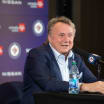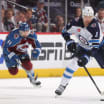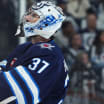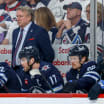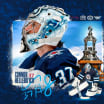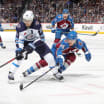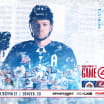The greatest moment in Joe Daley's hockey career didn't take place on the ice. It didn't arrive in front of a huge crowd of adoring fans. It didn't happen while stopping the shots of some of the greatest players in the game's history.
An extraordinary life
Daley: "I never regretted that decision to leave the NHL and jump to Winnipeg in the WHA."
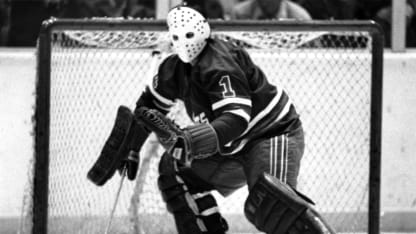
By
Scott Taylor / Game On Magazine, Year 7, Edition 1
In fact, it happened in his kitchen.
"I think the biggest moment of my career was the day that I was at home listening to the radio in 1966, at the time of the first expansion," Daley recalled with a quiet smile. "I heard that the Pittsburgh Penguins had selected Joe Daley in the NHL expansion draft while I was hearing names like Glenn Hall, Terry Sawchuk and Jacques Plante. I think then, something registered with me. 'Maybe now there are some people who feel I might have a chance to be a player,' I thought. That day was pretty special for me."
Joe Daley had plenty of wonderful moments in a 16-year professional hockey career that ended with a World Hockey Association championship in front of his family and friends at the old Winnipeg Arena.
And this year, the 75-year-old Daley will receive the ultimate honour. Already an honoured member of the Manitoba Hockey Hall of Fame (1995) and the WHA Hall of Fame (2010), Daley will be formally inducted into the Manitoba Sports Hall of Fame on Nov. 3, 2018 at the induction dinner at Winnipeg's Victoria Inn.
Born and raised in Winnipeg, Daley played more than 100 NHL games with Pittsburgh, Buffalo and Detroit before coming back home to play for the World Hockey Association's Winnipeg Jets in the new outlaw World Hockey Association in 1972.
The All-Time WHA leader in games played (308) by a goaltender, in wins (167), and play-off wins (30), Daley was a three-time all-star and one of only a handful of players to win the AVCO Cup three times in the seven years of the league's existence.
Coming home to play in Winnipeg turned out to be one the highlights of his career.
"Coming home to play in Winnipeg also turned out to be a special moment for me," he recalled. "I never regretted that decision to leave the NHL and jump to Winnipeg in the WHA. I played with some wonderful players.
"I look back on it now and I appreciate the quality of the guys we had playing in Winnipeg over the seven years of the WHA. We had Bobby (Hull) and obviously, for me, Bobby coming to Winnipeg meant the survival of the league for seven years. He was the most important factor for me and for hockey and for all of us who certainly got a pay raise by jumping from the NHL to the WHA. I think there are a lot of players who owe a debt of gratitude to Bobby."
When Daley got word of his induction into the Manitoba Sports Hall of Fame back in May, he added another highlight to his list.
"The day I got notified that there were other people who believe that I should join the likes of Turk Broda, Sugar Jim Henry, Eddie Belfour, Terry Sawchuk and Chuck Gardner in the Manitoba Sports Hall of Fame, that was special," he said. "I was thrilled that our three teams went into the Hall and I spoke on behalf of our teams that day and it was pretty neat for me. But this is bigger. To be going into the Hall as an individual is so much bigger. Somebody said 'You're being recognized for your efforts as an athlete,' so that's pretty special."
Daley joined four other athletes when he was inducted on Nov. 3: Swimmer Kirby Cote, speedskater Donna (McCannell) Keating, curler Jeff Stoughton and basketball star Joey Vickery.
It will be the culmination of an extraordinary life in hockey. And it all started at Bronx Park Community Centre.
"I had a lot of fun playing minor hockey in Winnipeg," he said. "I was eight-years-old when I first walked down the highway to Bronx Park from Leighton Ave., in East Kildonan. I went to the community club because I'd heard there was a sign up for Tom Thumb Hockey. I looked at the sheet and there were no names down for a goalie so I put my name down to be a goalie.
"I went home and told mum and dad that I'd signed up for community club hockey, and they asked me, 'What position did you sign up for?' and I said, 'Goalie,' and they said, 'Why?' and I said, 'Because nobody else put their name down and I think I'm going to have a pretty good chance to play.'"
That was the start of a long career in a game that Daley quickly learned to love. He got so good, so quickly that on any Saturday in the Bronx house league, he'd play for his team while other teams prayed their goalie wouldn't show up so they could ask Joe to play for them, too.
"I might get in a couple or three games on a Saturday when I was only supposed to play one," he said. "And before you knew it, there was a fellow coming around the community club, standing in the snow bank and watching me play on weekends and he called me over one day and said, 'We want you to come over to East End Barons and play in our playground hockey team. We think you're going to be pretty good.' So I left Bronx and went to East End Barons to play playground hockey and we had a pretty good team.
"But by the time I reached Bantam, I went back to Bronx and played out my minor hockey at Bronx, winning the provincial juvenile championship in my last year and that was special because no team had won a championship out of Bronx since Terry Sawchuk did it."
After being property of the Boston Bruins as a 16-year-old, he became property of the New York Rangers as a 17-year-old. However, after attending the Rangers' Winnipeg training camp, he played his final year of juvenile at Bronx Park. In between, the Rangers signed a veteran goaltender and Daley was left unprotected long enough to be signed by Jimmy Skinner and the Detroit Red Wings.
So in 1961, the Red Wings sent Daley and a group of other Manitoba players out to Weyburn to play for the first-year Red Wings of the Saskatchewan Junior League. In Weyburn's inaugural season, the Red Wings finished seventh, but Daley was so good, he won the SJHL's Rookie of the Year and Most Valuable Player Awards.
"I played that year on the Saskatchewan Junior League All-Star team against the Manitoba Junior League All-Stars and that was fun," Daley said. "That's when I got to know Normie Beaudin (the first player ever signed by the WHA's Winnipeg Jets), who was playing in Regina at the time."
After a great year in Weyburn, he went to the Red Wings' training camp and had to beat out 10 other goaltenders for a job. That wasn't going to happen, but he didn't quit. He accepted an assignment to play for the Johnstown Jets in the Eastern Hockey League.
"We used to get our cash envelope every Monday," Daley said with a laugh. "I don't think it was a pro league at the time, but I got paid. We had one goalie and 15 players. It was unbelievable."
He played there for two full seasons and then ended up playing for Coach Vic Stasiuk and the Memphis Wings in the Central League in 1965. He spent two seasons in Memphis, playing 16 games for the American Hockey League's Pittsburgh Hornets, and got onto the radar of a number of NHL teams.
"In Memphis, Red Sullivan noticed me," Daley said. "Red was going to be the head coach of the new Pittsburgh Penguins of the expanded NHL and he fell in love with my play and that's why I got drafted by the Penguins. I like to say I was the first player chosen by the Penguins, but in the expansion draft, they took goalies first, so there's that."
He was up and down between Pittsburgh and the AHL's Baltimore Clippers for three seasons and then, in 1970, the NHL decided to expand again.
"Punch (Imlach) was the GM of the new Buffalo Sabres," Daley explained. "Punch obviously saw something in me and he made a deal with Pittsburgh so that he could get me before the draft so that's why I can rightfully say, I was the first member of the Buffalo Sabres."
Daley spent a year in Buffalo, but Imlach had a chance to get Mike Robitaille and Don Luce from Detroit. The Wings wanted a goalie so while Imlach offered Dave Dryden to the Red Wings, Detroit wanted Daley back.
After an up-and-down (mostly down) year in Detroit in 1971-72, Daley wasn't certain about his future until the rumour surfaced that there might be a new professional league forming.
"That's about the time I got a call from Billy Robinson of the new Winnipeg Jets," Daley recalled with a wide smile. "He said, 'What do you think of the opportunity to come home and play in Winnipeg?' And I'm thinking, 'This has to be something coming from heaven because I wanted no part of the Red Wings anymore,' so I said to Billy, 'Yeah, I'm interested,' and we worked out a deal on the phone. It was that quick. The season was still going in the NHL and I'd already cut a deal with Billy. The Red Wings called me in at the end of the year and Ned Harkness, the GM, said, 'We'd like to discuss a two-or-three-year contract and I said, 'I don't think that's gonna happen,' and I went and packed up my gear, came home with a brand new set of equipment and with no intentions of ever going back to Detroit.
"The rest, as they say, is history."
Daley had a wonderful seven years in Winnipeg and while he played on three Avco Cup championship teams, he also beat the greatest team in the world.
On Jan. 5, 1978, after the Soviet National Team had won three straight games from the Jets in Tokyo, the Russians took a quick 2-0 lead, but with Daley in goal, the Jets battled back and beat the best team on the planet in front of a full house at Winnipeg Arena, 5-3.
"Well, I was supposed to play the third game against the Russians in Japan, but in warm-up, I got hit in the ankle and could hardly stand up," Daley said. "Unfortunately, for my goaltending partner, Gary Bromley, who enjoyed himself a little more than normal the night before, he had to play again. He was so upset. So I didn't get a chance to play against them over there but when we came home, we played against them at Winnipeg Arena and we were very fortunate to beat them.
"When Anders (Hedberg) stood up in the locker room after the game and said, 'Boys, I hope you know what we accomplished tonight,' it really set in for all of us. Anders, a guy who played against the Russian National Team many times and probably never beat them (with Team Sweden) and yet here we were, a club team, that took them to task that night. It's a memory that many fans in Winnipeg will cherish forever.
"An exhibition game or not, we beat one of the best teams in the world in Winnipeg that night. Of course, for most of my career, I treated exhibition games with respect because exhibition games were important to me. I was usually trying to win a job and I needed to play well in those games. Beating the Russians was sure fun."
It's always interesting to note that Daley was one of the last goaltenders to wear a mask. In fact, he never wore one until his third season in Winnipeg.
"I never wore one for any length of time until my last five years in Winnipeg," he said. "That was due to my goaltending partner, Ernie Wakely. Ernie, who is still a great friend, suggested that maybe I should get one made so my evening in the net would be a long one and he wouldn't have to come in and replace me after I got hit in the face."
After he retired, he coached the Penticton Knights for a while, but returned to Winnipeg and opened up Joe Daley's Sports Cards which is now, Joe Daley's Sports and Framing. You can find him in the store every day.
"I played the game because I wanted to play the game," he said with a smile." At the end of the day, somebody paid me for doing something I loved to do. I think the game was very good to me. I hope that I gave enough back to the game that I don't feel I cheated anybody. We had a lot of fun. Maybe more than we should have.
"As I will say at the induction dinner, I have to thank Billy Robinson, Ben Hatskin, Barry Shenkarow and Michael Gobuty and all the people who made my last seven years as a member of the Winnipeg Jets the greatest years of my life. I'm 75 now and I can look back and be very proud of my career. Being inducted into the Manitoba Sports Hall of Fame will be a very special moment."



